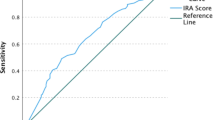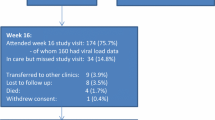Abstract
Background
The effectiveness of traditional adherence measurements used in adolescent populations is difficult to assess. Antiretroviral (ARV) adherence research among adolescents living with HIV in resource-constrained countries is particularly challenging and little evidence is available.
Objectives
The primary objective of this study was to determine the feasibility of a large-scale, long-term study using electronic adherence monitoring in Uganda. The secondary objective was to compare accuracy of pill count (PC) and self-report (SR) adherence with electronic medication vials (eCAPs™).
Methods
Adolescents receiving ARV therapy at the Joint Clinical Research Centre in Kampala, Uganda, were recruited. ARVs were dispensed in eCAPs™ for 1 year. Person-pill-days (PPDs) [1 day where adherence was measured for one medication in one patient] were calculated and a weighted paired t-test was used to compare the levels of adherence among subjects for three different adherence measurement methods.
Results
Fifteen patients were included: 40% were female, mean age was 14 years, mean baseline CD4+ cell count was 244 cells/μL, and average treatment duration was 9 months at study entry. Overall, 4721 PPDs were observed. Some eCAPs™ required replacement during the study resulting in some data loss. Consent rate was high (94%) but was slow due to age limit cut-points.
Overall adherence for SR was 99%, PC was 97% and eCAP™ was 88% (p<0.05 for all comparisons). 93%, 67% and 23% of patients had an adherence of greater than 95% as measured by SR, PC and eCAP™ methods, respectively.
Conclusions
A large-scale adherence study in Uganda would be feasible using a more robust electronic monitoring system. Adherence measurements produced by PCs and self-reporting methods appear to overestimate adherence measured electronically.



Similar content being viewed by others
References
Haberer J, Mellins C. Pediatric adherence to HIV antiretroviral therapy. Curr HIV/AIDS Rep 2009; 6 (4): 194–200.
Biadgilign S, Deribew A, Amberbir A, et al. Adherence to highly active antiretroviral therapy and its correlates among HIV infected pediatric patients in Ethiopia. BMC Pediatr 2008; 8: 53.
Davies MA, Boulle A, Fakir T, et al. Adherence to antiretroviral therapy in young children in Cape Town, South Africa, measured by medication return and caregiver self-report: a prospective cohort study. BMC Pediatr 2008; 8: 34.
Müller AD, Bode S, Myer L, et al. Electronic measurement of adherence to pediatric antiretroviral therapy in South Africa. Pediatr Infect Dis J 2008; 27 (3): 257–62.
Nachega JB, Hislop M, Nguyen H, et al. Antiretroviral therapy adherence, virologic and immunologic outcomes in adolescents compared with adults in southern Africa. J Acquir Immune Defic Syndr 2009; 51 (1): 65–71.
Bakanda C, Birungi J, Mwesigwa R, et al. Survival of HIV-infected adolescents on antiretroviral therapy in Uganda: findings from a nationally representative cohort in Uganda. PloS One 2011; 6 (4): e19261.
Twagirumukiza M, Kayumba PC, Kips JG, et al. Evaluation of medication adherence methods in the treatment of malaria in Rwandan infants. Malaria J 2010; 9: 206.
Bell DJ, Kapitao Y, Sikwese R, et al. Adherence to antiretroviral therapy in patients receiving free treatment from a government hospital in Blantyre, Malawi. J Acquir Immune Defic Syndr 2007; 45 (5): 560–3.
Bikaako-Kajura W, Luyirika E, Purcell DW, et al. Disclosure of HIV status and adherence to daily drug regimens among HIV-infected children in Uganda. AIDS Behav 2006; 10 (4 Suppl.): S85–93.
Martin S, Elliott-DeSorbo DK, Wolters PL, et al. Patient, caregiver and regimen characteristics associated with adherence to highly active antiretroviral therapy among HIV-infected children and adolescents. Pediatric Infect Dis J 2007; 26 (1): 61–7.
Nabukeera-Barungi N, Kalyesubula I, Kekitiinwa A, et al. Adherence to antiretroviral therapy in children attending Mulago Hospital, Kampala. Ann Trop Paediatr 2007; 27 (2): 123–31.
Bärnighausen T, Chaiyachati K, Chimbindi N, et al. Interventions to increase antiretroviral adherence in sub-Saharan Africa: a systematic review of evaluation studies. Lancet Infect Dis 2011; 3099 (11): 1–10.
Bisson GP, Rowh A, Weinstein R, et al. Antiretroviral failure despite high levels of adherence: discordant adherence-response relationship in Botswana. J Acquir Immune Defic Syndr 2008; 49 (1): 107–10.
Acknowledgements
We wish to thank the study participants for agreeing to be part of this study. We also thank the management and staff of the JCRC, Kampala, Uganda, for enabling the study to take place, and in particular the following staff of the Department of Paediatrics: Hilda Kizito, Eva Natukunda, Asia Namusoke, Ruth Enabu, Margaret Mugisha, Ruth Sendi, Annet Nandudu, Wilfred Opilo, Alice Kwaga and Priscilla Kyobutungi.
This study received no external funding. All authors have no conflicts of interest to declare that are directly relevant to the content of this study.
Author information
Authors and Affiliations
Corresponding author
Rights and permissions
About this article
Cite this article
Wiens, M.O., MacLeod, S., Musiime, V. et al. Adherence to Antiretroviral Therapy in HIV-Positive Adolescents in Uganda Assessed by Multiple Methods. Pediatr Drugs 14, 331–335 (2012). https://doi.org/10.1007/BF03262238
Published:
Issue Date:
DOI: https://doi.org/10.1007/BF03262238




